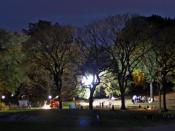Labour
Critically examine new labour policy on law and order relative to those embraced by their conservative predecessors.
Some political scientists argue that it seems there has been a political consensus tilting further to the right on the spectrum on the issue of law and order in the UK since 1979.
However, other commentators refute such claims as being simplistic and ill thought out, thereby, creating a political controversy which, some say, splits contemporary analysts down the middle.
Many critics argue Conservative policy on law and order during their 18 year rule can be summed up into three broad categories. The first phase is referred to as the "popular authoritarianism" phase and dates roughly between, some say, 1979 and 1987. Many analysts suggest that this period was hugely characterised by what many saw as raw retribution measures as Thatcher promised to 'reinforce the rule of the law' and 'tip the balance of justice in favour of the law abiding citizen over criminals'.
For example she introduced the Criminal Justice Act of 1982 which introduced the "sharp, short, sock" or boot camps if you like to tackle juvenile delinquencies. Her Police and criminal evidence Act 1984 increased police powers to stop and search while extending the time the police would question a suspect to 72hrs. Many also suggest that the iron lady even improved police pay by over 16% whereas increasing prison expenditure by 80% perhaps so that to she could, some say, keep them on govt's side.
Some analysts 'point that the most controversy piece of legislation
Liked the Brixton riots to a decline in family values
Public order Act 84/86--- paved way for enhanced the use of "crowd control" tactics by the police whilst drawing criticism of centralisation of police+ police under illegitimate political control of govt.
Second phase:...


